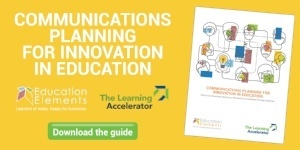Ed Elements: Betsy Devos’s confirmation process was one of the toughest anyone can remember. What do you think made people so passionate about her nomination?
Michael Horn: The toughest ever certainly for an education secretary. I think there were three things in particular that made people so passionate. First, to understate it, there is obviously a lot of passion around Trump’s election with many who did not support him opposed virulently and reflexively to anyone he would nominate and determined to see at least one of his picks for Cabinet “go down”, so to speak. Second, despite Devos’s long-time involvement in education and a deeper and more mainstream track record than has been portrayed by the mainstream media, no matter how you slice it, her hearing did not go well. It revealed some significant apparent blind spots in her awareness of some of the questions swirling around education and the federal government and Department of Education’s role in particular. It did not seem as though she was prepared well at all by Trump’s transition team.
This built a narrative to question her qualifications for the job. Finally, Devos has been a school choice hawk--in all its forms--for many, many years. That’s the big thing the public knows about her. And, as Ross Douthat wrote in the New York Times, that of course is immensely threatening to certain parts of the education establishment and so they were ready to fight.Ed Elements: Taking into account things we heard on the campaign trail, what we heard during hearings and what we know about Devos’s past, what are the first few changes you expect we might see as she moves into this new role?
Michael Horn: First, I don’t think we should pretend we have any certainty around any of what we will see.
With that caveat in place, here are my best guesses. I think we are likely to see some attempt at a bill that promotes school choice from the federal government, likely in the form of tax scholarships. For that to occur though, it will have to be driven by Congress; it’s not something Secretary Devos can put into effect by herself. Many conservatives are wary of the federal government interfering with state and local educational prerogatives and pushing a mandate around school choice, so I’m not sure how much legs that will actually have.
I do think we will see a loosening of regulations that may give states and districts more autonomy in how they spend education dollars from the federal government. Trump has been clear he wants to strike down regulations, and many conservatives have been unhappy with the extensive regulations Secretary King put in place around the Every Student Succeeds Act, (ESSA) so I think you will see a loosening of many of those.
Ed Elements: What do you see as the likely impact on personalized learning in schools? Do you foresee any shifts to funding or policies that might positively or negatively impact personalized learning?
Michael Horn: As I’ve long said and the research confirms, regulations that dictate inputs--the resources on which schools must spend and the processes for how they do things--constrain innovation and limit the ability for districts to deploy technology in innovative models that better personalize learning for students. So I think there is a possibility that, on the margins, this could help move schools away from a compliance mentality and allow them to be more innovative with funding to tackle challenges in novel ways. In particular, I think you’ll see new regulations around the “supplement-not-supplant” provision, and I think you’ll see changes in the accountability regulations that more closely reflect the flexibility as written in ESSA.
I am personally skeptical that we will see any direct initiatives around personalized learning as we did in President Obama’s administration--in the form of competitive grants or other such programs. I think there is an outside chance that we will see continued investment in fundamental infrastructure--broadband, in particular--given what we know about President Trump’s thoughts on infrastructure more generally, but it’s hard to know for sure given conflicting signals. More generally, I do think clarity around what the administration will and won’t do with regards to education would be helpful; confusion and lack of clarity stunts innovation, and there is a lot of confusion right now.
I do think that there is a very real possibility that Devos will use her bully pulpit to speak out in favor of personalizing learning. I base this on a few things. We know that Devos has been close to Governor Jeb Bush and served as a board member for his Foundation for Excellence in Education. Governor Bush has been one of the biggest policy advocates on the national stage for personalizing learning through digital learning for many years now through his leadership of Digital Learning Now!, among other initiatives. We also know that Devos has had strong ties to and been supportive of the Grand Rapids School District--yes, a school district--that has undertaken significant blended-learning initiatives to reinvent itself over the past several years.
I think the question for many of us who advocate for and work to personalize learning for all students so that all students can fulfill their potential is this: If Devos attaches herself to the cause of personalizing learning, how do we be sure that we can embrace the good of that while making sure it doesn’t poison the concept for those stakeholders throughout the country who will remain reflexively opposed to anything the Trump administration does? That is, if Devos advocates for personalizing learning, there is a chance that many educators and policymakers who know little about the idea behind personalizing learning and what it stands for will just automatically oppose the idea, which could very negatively impact its brand, if you will. How do we guard against that and continue to educate all people to embrace this idea for all students?
Ed Elements: Devos is in favor of giving more power back to the states. What are the benefits of more state control? What are the drawbacks?
Michael Horn: She is, but I also think that ESSA already did that when it was passed and signed into law by President Obama over a year ago, so outside of the loosening of regulations we talked about, I’m not sure she’ll be able to do much more. The opportunity of giving states--and more specifically educators in schools themselves--more control is that there can be more innovation: more opportunities to try novel ways of educating students that personalize and match different needs and local circumstances. We have seen some of the drawbacks in that individual states can lower the bar for what they expect students to be able to know and do, in particular for local political reasons. Lowering expectations for students has very real dangers, even as I think we must create a much fairer system focused on student outcomes that measures each and every individual student’s raw growth as well as mastery, not just proficiency.
Ed Elements: There is a lot of speculation that this is good for charter schools and less so for traditional public schools. Do you see ways in which all schools will benefit?
Michael Horn: I guess I don’t entirely agree with that speculation. Certainly I think charters may get some boosts over the next 2 or 4 years. But from my perspective, charter schools have long had a lot of freedoms in how they operate--how they structure their inputs. That gives them a lot of room to innovate. People then look at the district schools and say, “Why can’t you innovate like those schools?” But that’s not a fair point, because not only do district schools have a long legacy of how things have always been done that are not easy to discard, they also have lots of regulations that dictate what they can and cannot do that create a compliance mindset that, for many, overwhelms the opportunities to innovate and focus on the outcomes for each and every single student. If we could loosen up some of those regulations around inputs, we could see more innovation from all educators on the ground. The key is to make sure we’re innovating on behalf of each and every single student--not just some. On balance, I’m optimistic educators will rise to the challenge.
Lastly, I think outside of Washington, DC, we will see more states creating “Course Access” or “Course Choice” policies. Why? Because school choice is a policy that really only impacts students in urban environments, some suburban ones. It’s not a policy that will really benefit or help students in exurban and rural school districts, where President Trump’s base lives in many cases. Course Access allows dollars to follow students down to the individual course level--be that an online course or one from a local community college--and pays the provider only upon successful completion by the student, such that rural and exurban districts could essentially offer an unlimited course catalog to their students. I think that will not only create opportunities for innovation, but also push schools to innovate to create more enticing and personalized opportunities for students.
Either way, we’re going to see a lot of rhetoric about choice over the next several years--and I’m hopeful that doesn’t stay limited to “school choice”, which will only impact a few, but to “educational choice”, which, in certain respects, is at the heart of personalizing learning for all students. Hopefully this will prod all schools to step up and innovate to personalize for all.
Michael Horn is the co-author of two books which fundamentally changed the way we think about education: Disrupting Class and Blended. Both an Education Elements board member and one of the predominant thought leaders about personalized learning, Michael will share his thoughts on how the world has changed since writing his books and what we can expect of the future. If you have heard Michael speak before prepare yourself for a different experience this time around.





